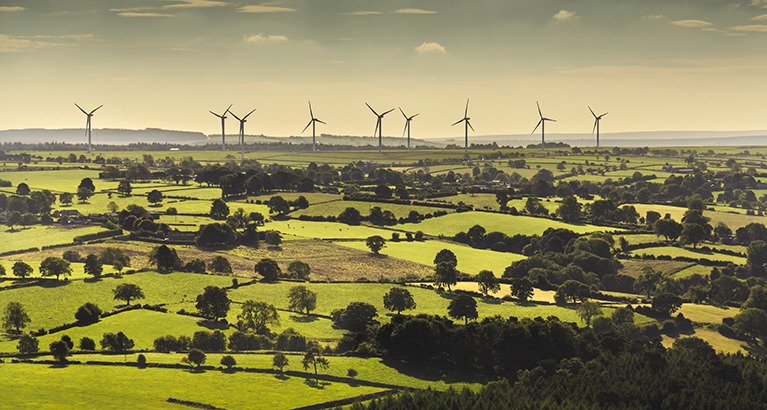The UK government is committed to achieving net zero carbon emissions by 2050. The government is also committed to improving Britain’s lagging growth. How do those 2 goals intersect? And how does this affect the goal of green growth and a green industrial revolution as sought by policymakers?
Research by Michael Pollitt, Professor of Business Economics at Cambridge Judge Business School, and Victor Ajayi, Associate Researcher at the Energy Policy Research Group (EPRG) based at Cambridge Judge, examines these issues by focusing on the UK’s total factor productivity (TFP) growth in the electricity sector over the next few decades. TFP is a key measure of economic performance that measures an economy’s ability to generate income from inputs such as capital investment, labour and materials.
The research does this through a simulation model that examines input growth and output growth, as part of aims to achieve deep decarbonisation of the power sector through large-scale clean energy investments. Put simply, the research looks at the growth of inputs for investment in low-carbon technologies relative to expectations of rising output, and their implications relating to productivity.
UK productivity set to dip in 2020s, rebound expected in 2030s and 2040s

The results of the research are more encouraging for the longer term than the shorter term.
“The result shows that the 2020s are challenging,” says the study, “as productivity declines by −3.24 % per annum in the electricity sector due to the combination of high input and low output growth. However, our findings reveal that the 2030s and 2040s look more promising, with productivity growth of 3% per annum and 1.6 % per annum, respectively, as electrification increases and fossil fuel and labour inputs decline.”
The analysis also suggests that the natural gas supply sector and new low-carbon sectors such as hydrogen face productivity challenges of their own: for natural gas, the question is whether costs can be reduced as quickly as output to maintain total factor productivity (TFP), while for hydrogen the key issue is to what extent TFP growth will be delayed by investment growth outpacing output growth initially.
“Even when we look at an energy sector where total demand is expected to grow under net zero, namely, electricity, the challenge of raising TFP in a net zero world is clear,” the research says. “We show, by means of a concrete worked example, that net zero policies can mean low or negative TFP growth over prolonged periods and that politicians should not imply that the economy will grow faster under them.”
Like the UK, the European Union and the US currently have a 2050 target for getting greenhouse gas emissions to net zero, while the announced target is 2060 in China and 2070 in India.
Study highlights trade-offs between net zero targets and economic growth
The research co-authored by Michael looks at the trade-off between net zero targets and productivity growth based on a model that looks specifically at the UK but has application more broadly.
“Our research challenges the assumption that green growth that promotes environmental protection will also increase – or at least not reduce – the pace of economic growth,” says Michael. “While policymakers often view the concept of green growth as sustainable growth that delivers win-win societal outcomes, such acceptance of the green growth concept tends to circumvent the trade-offs involved between protecting the environment and short-term economic effect.
“While the green growth concept is popular among both politicians and environmentalists, we feel that it’s important to carefully analyse the economic impact, and our research finds that the economic case for this concept is very challenging at least through the 2020s.”
Michael spoke on the economic issues surrounding greener energy at the Sustainable Development Forum conference in Belgrade, Serbia, on 14-15 November, which was titled ‘The Green Transition – Economy, Energy & Health’. The conference organiser was Cambridge Judge Business School alumnus, Kosta Zivanovic (MPhil Technology Policy 2017) who, while a student organised a similar event in Cambridge, which fostered engagement between students and professionals. The conference continued this legacy, and was evolved to serve as a premier professional gathering addressing critical aspects of sustainable development.
3 factors that puncture the idea of green growth as a panacea
“National and international efforts are currently geared towards green growth as a panacea for the urgent climate change and economic challenges,” says the research, which, while endorsing the goals of environmental protection and sustainable development, points out several issues in the UK that puncture the idea of such a panacea:
1
UK industry’s green tech investment challenges
A lack of evidence that UK industry is well placed to benefit from first-mover investments in hydrogen, nuclear power and carbon capture, usage and storage, as such technologies require scale for success perhaps best suited to other larger countries.
2
Labour market disruptions from green policies
Green policies affect labour markets via supply chain disruption and reduction in overall demand. While many workers in carbon-intensive sectors like oil and gas would shift to greener jobs, this will entail significant transition costs at least in the short term.
3
Limited job creation in green industries
“Not many jobs can be created in new green industries, that is economic activities that seek to minimise impact to the environment.” While renewable energy is supposedly more labour-intensive than conventional energy at the construction and installation stages, data from the International Energy Agency shows that with the exception of solar installation “renewable projects create the least jobs, between one and 2 jobs per million dollars of capital investment”, while energy efficiency in buildings and industry are far more job creating based on such measures.
What does green growth mean anyway?
The debate over the economic impact of moving toward renewable energy sources is complicated by the fact that even the definition of ‘green growth’ is not uniform.
While the Organisation for Economic Co-operation and Development (OECD) says green growth implies “fostering economic growth and development while ensuring that natural assets continue to provide the resources and environmental services on which our well-being relies”, the World Bank says green growth is “growth that is efficient in its use of natural resources, clean in that it minimises pollution and environmental impacts, and resilient in that it accounts for natural hazards and the role of environmental management and natural capital in preventing physical disasters”.
As Michael and Victor note: “Although both the OECD and the World Bank definitions give prominence to growth, the OECD concept of green growth underscores a more stringent sustainability level compared with the World Bank which is somewhat equivocal about the extent of environmental preservation.”
Meanwhile, the United Nations Environment Programme uses the term ‘green economy’ rather than ‘green growth’, and defines it as a policy that simultaneously grows income and improves human well-being “while significantly reducing environmental risks and ecological scarcities” – which the research’s authors describe as a more encompassing definition than either the OECD or World Bank.
Productivity issues for UK electricity sector despite expected positive impact from net zero
“The novel contribution of this paper is to highlight the difficulty of achieving green growth in the context of a discussion about the underlying determinants of total factor productivity,” says the research. “We do this with reference to the specific example of the UK electricity industry. This industry has well-worked net zero trajectories from today until 2050 and a simple characterisation of output and inputs. By using these we can illustrate the nature of the productivity challenge even for a sector which is expected to be positively impacted by net zero policies.
“Fundamentally, if net zero requires higher physical inputs and reduces physical output, it will be challenging to raise measured productivity. The only route to higher productivity in energy sectors will be a relative increase in the real value of unit output, and this will probably mean higher actual general inflation adjusted unit prices. Higher headline energy prices (relative to 2020), if caused, by net zero policy may be difficult to implement politically.
“Our analysis therefore suggests rather than focussing solely on measures of inputs in green industries – such as job creation and capital investment – politicians need to pay attention to the underlying productivity of green industries, that is outputs per weighted inputs.”
Featured research
Pollitt, M. and Ajayi, V. (2024) “Green growth and net zero policy in the UK: some conceptual and measurement issues.” Energy Strategy Reviews





